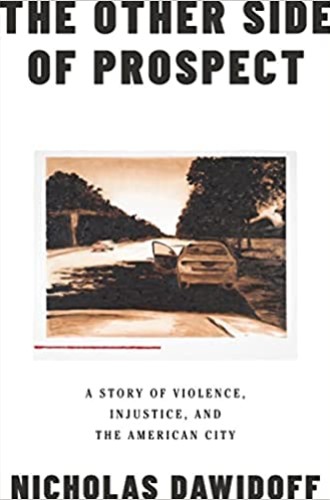No justice in New Haven
Journalist Nicholas Dawidoff tells the tragic story of Bobby Johnson and his neighborhood on the poor, Black side of town.
In The Other Side of Prospect, what first appears to be a straightforward case of a murder and wrongful conviction becomes the story of a forgotten community in a divided nation. Journalist Nicholas Dawidoff weaves together history and biography to trace the rise and fall of Newhallville, a formerly thriving middle-class neighborhood in New Haven, Connecticut, that is now beset with poverty and gun violence. In gripping prose, he shows that every tragedy has a hidden history, and he exposes the forces—from slavery to Jim Crow and mass incarceration—that have produced inequality and injustice in New Haven.
The book, the product of eight years of research and interviews, centers on the killing of Pete Fields during the summer of 2006. A retired grandfather and stalwart of the community, Fields grew up in Newhallville before doing well enough working in a factory to move his family to the suburbs. But he returned to the neighborhood regularly to visit friends and play cards. It was on such a visit that Fields was robbed and gunned down in his car.
The subsequent outcry put pressure on police to solve the case. Bobby Johnson, a 16-year-old known for hanging around a corner store close to the crime scene, became the primary suspect. Bobby, who was “unfinished enough as a person that older relatives thought of him as both unworldly and over-trusting,” was arrested even though he had an alibi and another local resident was a clear suspect. After a grueling interrogation, Bobby confessed to the crime, assured he would receive probation. Instead, he was given a 38-year sentence.
New Haven, the home of Yale University, is a city of extremes. When I was a student at Yale, I lived in the quiet enclave of East Rock on the affluent side of New Haven. I was warned against venturing too far from the university, and it did not take me long to notice how inequality is reinforced in both overt and subtle ways. Dawidoff writes:
Prospect Street was the invisible railroad track, the boundary that cleaved their New Haven into two unequal cities, one affluent and white, the other poor and black. . . . and plenty of people on the Newhallville side felt also that there was disregard, an assumption that their circumstances existed because they were different rather than differently treated.
The young Bobby liked to explore the other side of Prospect on his bike. Even as a child, he grasped the uneasy tension between these two worlds—a tension that would help land him in prison.
The most compelling part of The Other Side of Prospect may be its portrait of Bobby’s time in prison. Beneath the monotony of the facility’s routines, we glimpse the fear, rage, and depression that make prison, in Bobby’s words, a “place of torture.” Those who survive to reenter society find themselves as second-class citizens without reliable work and housing—and, most of all, without hope. Reflecting on his experiences in prison, Bobby says,
I question God. . . . Why’s he, the Almighty Powerful, allow it? Why do such a small amount of people have all the money to do what they want? If God knows about that, why he allow it? . . . How many are praying to get out of a situation and they’re still in it, suffering, poor, broke, just getting by, scraping the plate.
Through Bobby’s eyes, we see why mass incarceration is one of the greatest civil rights issues of our time.
Dawidoff chronicles the tireless efforts of many people, including attorney Ken Rosenthal, to get justice for Bobby. Eventually, his conviction was overturned and he was released after spending nine years in prison. The book ends on an uncertain if hopeful note. While Bobby struggles to adapt to a new world after being released, he is grateful for a second chance at life. He says he always knew he was a “good person,” a truth obvious to readers but invisible to the system that imprisoned him.
Perhaps this book’s greatest gift is its honesty. After listening to hundreds of locals, Dawidoff can put into words a hidden truth: what happened to Bobby was not a fluke but the result of a system working the way it was designed. James Baldwin, whose essays Bobby read in prison, wrote, “Not everything that is faced can be changed but nothing can be changed until it is faced.” Dawidoff’s unflinching account holds a mirror to our past, exposing the thread between our nation’s original sin of slavery and the broken neighborhoods that leave those like Bobby without options and without hope.
Teaching in prisons, I have met many Bobbys—young men and women whose only crime was to be poor and Black. For those who believe that a more just society is not only possible but necessary, The Other Side of Prospect reminds us that justice often comes at a steep price.





